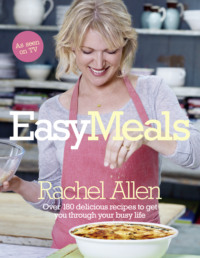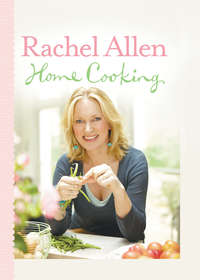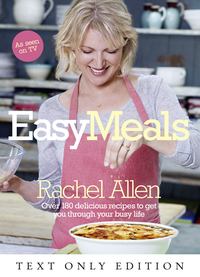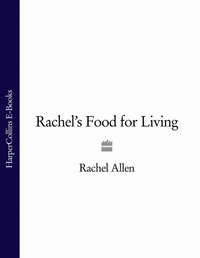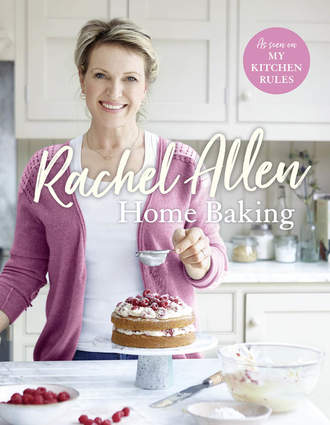
Полная версия
Home Baking


Copyright

HarperCollinsPublishers
1 London Bridge Street
London SE1 9GF
www.harpercollins.co.uk
First published by HarperCollinsPublishers 2017
FIRST EDITION
© Rachel Allen 2017
Cover layout design © HarperCollinsPublishers
Cover photograph © Maja Smend
Text © Rachel Allen, 2017
Photography © Maja Smend, 2017
Illustrations © Micaela Alcaino, 2017
Food styling: Annie Rigg
Props styling: Lydia Brun
Hair and make-up: Nicky Clarke
Please note:
Oven temperatures are given for a standard oven; if you are using a fan oven, reduce the stated temperature by 20ºC.
Eggs, vegetables and fruit are medium unless otherwise stated.
In Ireland, you can buy regular fresh cream which is almost as rich as double cream and is suitable for recipes calling for double cream.
Bicarbonate of soda is sold as ‘bread soda’.
A catalogue record of this book is available from the British Library
Rachel Allen asserts the moral right to be identified as the author of this work
All rights reserved under International and Pan-American Copyright Conventions. By payment of the required fees, you have been granted the nonexclusive, non-transferable right to access and read the text of this e-book on screen. No part of this text may be reproduced, transmitted, downloaded, decompiled, reverse engineered, or stored in or introduced into any information storage retrieval system, in any form or by any means, whether electronic or mechanical, now known or hereinafter invented, without the express written permission of HarperCollins e-books.
Find out about HarperCollins and the environment at www.harpercollins.co.uk/green
Source ISBN: 9780008179823
Ebook Edition © October 2017 ISBN: 9780008179830
Version 2017-11-27
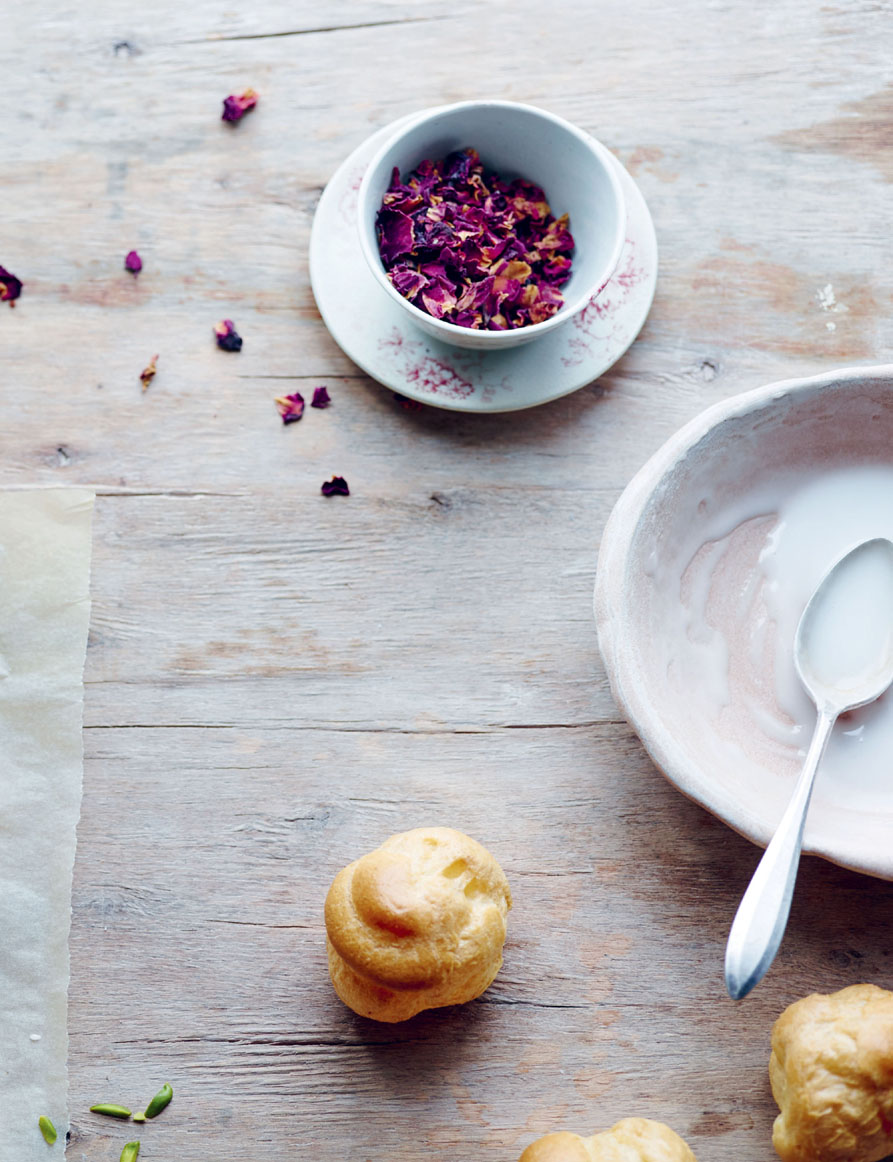
Contents
Cover
Title Page
Copyright
Introduction
Ingredients
Equipment
Cakes
Brûlée Meringue Cake
Chocolate, Honey and Hazelnut Cake
Triple Chocolate Celebration Cake
Chocolate Pain D’épices
Glazed Chocolate Cake
Dodo’s Sachertorte
Ombré Cake
Mary Jo’s Tres Leches Cake
White Chocolate and Strawberry Celebration Cake
Upside-Down Summer Berry Cake
Lavender and Lemon Cake
Spiced Pumpkin Cake with Cream Cheese Icing
Smørkage
Coffee and Cardamom Cake
Gingerbread Cake with Raspberries
Orange Kugelhopf
Polenta, Orange and Pistachio Cake with Orange Syrup
Walnut and Fig Cake with Honey Syrup
Crunchy-Topped Apricot Cake
Rhubarb Crumble Cake
Coconut and Orange Cake
Rich Fruit Cake
Clementine and Almond Cake
Banana and Date Loaf
Ginger Brack
Biscuits
Coffee Sandwich Biscuits
Brandy Snaps
Vanilla Macarons
Peanut Kisses
Tuiles D’amande
Cinnamon Stars
Iced Lemon Hearts
Chocolate Shortbread Hearts Dipped in Dark Chocolate
Chocolate Digestive Biscuits
Lemon, Polenta and Rosemary Biscuits
Gingerbread Trees
Double Ginger Cookies
Vanilla and Currant Biscuits
Cranberry and Orange Biscuits
Cardamom Butter Biscuits
Cinnamon and Lemon Biscuits
Lemon and Poppy Seed Biscuits
Chocolate and Hazelnut Cookies
Oat and Ginger Cookies
Peanut Butter and White Chocolate Cookies
Parmesan and Poppy Seed Biscuits
Cheddar and Herb Biscuits
Crunchy Oatcakes with Sesame Seeds
Rye and Caraway Crackers
Sweet Bites
Chocolate Cupcakes with Orange Buttercream Icing
Banana and Blueberry Muffins
Lemon and Poppy Seed Muffins
Lemon Meringue Cupcakes
Pear and Cardamom Buns
Blackberry and White Chocolate Buns
Rose and Pistachio Choux Kisses
Raspberry Financiers
Pine Nut Macaroons
Cinnamon and Pecan Rugelach
Raspberry and Custard Tartlets
Mini Carrot Cakes with Orange Cream Cheese Icing
Spiced Ginger Cakes
Peach and Almond Squares
Apple and Lemon Bites
Date, Coconut and Orange Squares
Lime-Glazed Coconut Cakes
Raspberry Crumbles
Strawberry and Raspberry Squares
Chocolate Orange Brownies
Choux Cinnamon Fingers
Pecan and Cinnamon Bakes
Apple and Blackberry Traybake
Maple Pecan Slices
Salted Caramel Peanut Bars
Chocolate and Coconut Flapjacks
Oat and Quinoa Bars
Persian Almond Bites with Rosewater Syrup
Savoury Bakes
Smoked Salmon, Tomato and Dill Tart
Smoked Haddock, Salmon and Prawn Pie
Aubergine, Mint and Feta Pashtida
French Onion Tart
Spanish Cheese, Honey and Thyme Tarts
Buttery Chicken and Mushroom Puff Pastry Parcels with Hollandaise Sauce
Asparagus, Tomato and Spring Onion Tart
Spiced Lamb Pasties
Baked Samosas with Chilli and Mint Dip
Knish Dumplings
Pâté Aux Pommes De Terre
Bite-Sized Yorkshire Puddings with Mustard Sausages
Pea and Cream Cheese Madeleines
Gougères
Smoky Paprika and Thyme Soufflé Bites
Cheese and Thyme Soufflés
Cayenne and Sesame Cheese Swirls
Caramelised Red Onion Swirls
Sausage Rolls with Fennel
Cheese and Rosemary Twists
Desserts
Chocolate, Fig and Hazelnut Panforte
Chocolate Pavlova with Salted Caramel Sauce
Chocolate and Hazelnut Rum Babas
Galette Des Rois
Blueberry and Almond Tart
Baked Crema Catalana
Strawberry and Vanilla Custard Kataifi Tart
Apple Gratin
Chocolate and Coffee Tart
Tarte Au Citron
Strawberry and Rose Meringue
Baked Sweet Saffron and Condensed Milk Rice Pudding
Baked Caramel Rice Pudding
Tarte Tropézienne
Baked Fruit Skewers
Breads
Cardamom and Pistachio Buns
Baked Doughnuts
Cranberry and Orange Scones
Pistachio and Cinnamon Doughnuts
Kouign-Amann
Chocolate Brioche Swirl Loaf
Croissants
Pain Aux Raisins
Southern Cornbread
Jewelled Kanellängd
Naan Breads
Pita Breads
Easy Soda Red Onion, Olive and Rosemary Focaccia
Cumin and Coriander Flatbreads
Multi-Seed Brown Bread
Basic Recipes and Techniques
Shortcrust Pastry
Sweet Shortcrust Pastry
Lining a Tart Tin and Baking Blind
Puff Pastry
Choux Pastry
Classic Brioche
Crème Pâtissière
Classic Buttercream Icing
Bread Techniques
Toasting Nuts
List of Searchable Terms
Acknowledgements
More from Rachel Allen
About the Publisher
Introduction
Baking has long been a source of joy and comfort in my life. I have vivid early memories of impatiently waiting alongside my mum and sister for sweet treats to emerge from the oven, and I’ve never tired of that wonderful sense of anticipation. For me, baking is a moment of respite and some time for contemplation. But it’s also time spent bustling around the kitchen with my family and friends. Either way, I think there’s something so joyous about stirring, kneading or whipping together ingredients and waiting (not always patiently) for the end result. I find the aromas, textures and flavours of baking, whether sweet or savoury, completely intoxicating.
In this book, I’m sharing some of my very favourite recipes that I hope will cater to your every baking need and whim. For those who aren’t au fait with the oven, I’ve provided some simple basic recipes and techniques. If pastry’s not your forte, for example, you’ll find fail-safe recipes for shortcrust, puff and choux here, here and here. There are also recipes for other staples such as Classic Buttercream Icing (the absolute best bowl to lick) and Crème Pâtissière. And, because I think it’s often just assumed that everyone knows the basic baking techniques, I’ve provided comprehensive instructions for things like kneading dough by hand and toasting nuts (here and here).
In every chapter, you’ll find a whole host of tempting bakes: sweet and savoury, simple and more complex, traditional and unfamiliar. In Cakes, for example, I’ve included my foolproof Upside-down Summer Berry Cake (remember, baking isn’t exclusively for those chillier months), and my go-to Rich Fruit Cake. These are the recipes I always rely on – they never let me down. You’ll also find some slightly less well-known bakes, such as my Smørkage – a divine treat hailing from Denmark – and my Chocolate Pain d’Épices, an intriguingly rich and spicy combination. Of course, a chapter on Cakes wouldn’t be complete without a few show-stoppers. My particular favourite is the Brûlée Meringue Cake, which I love to flame to a lovely golden colour in front of my guests for some real cooking theatrics!
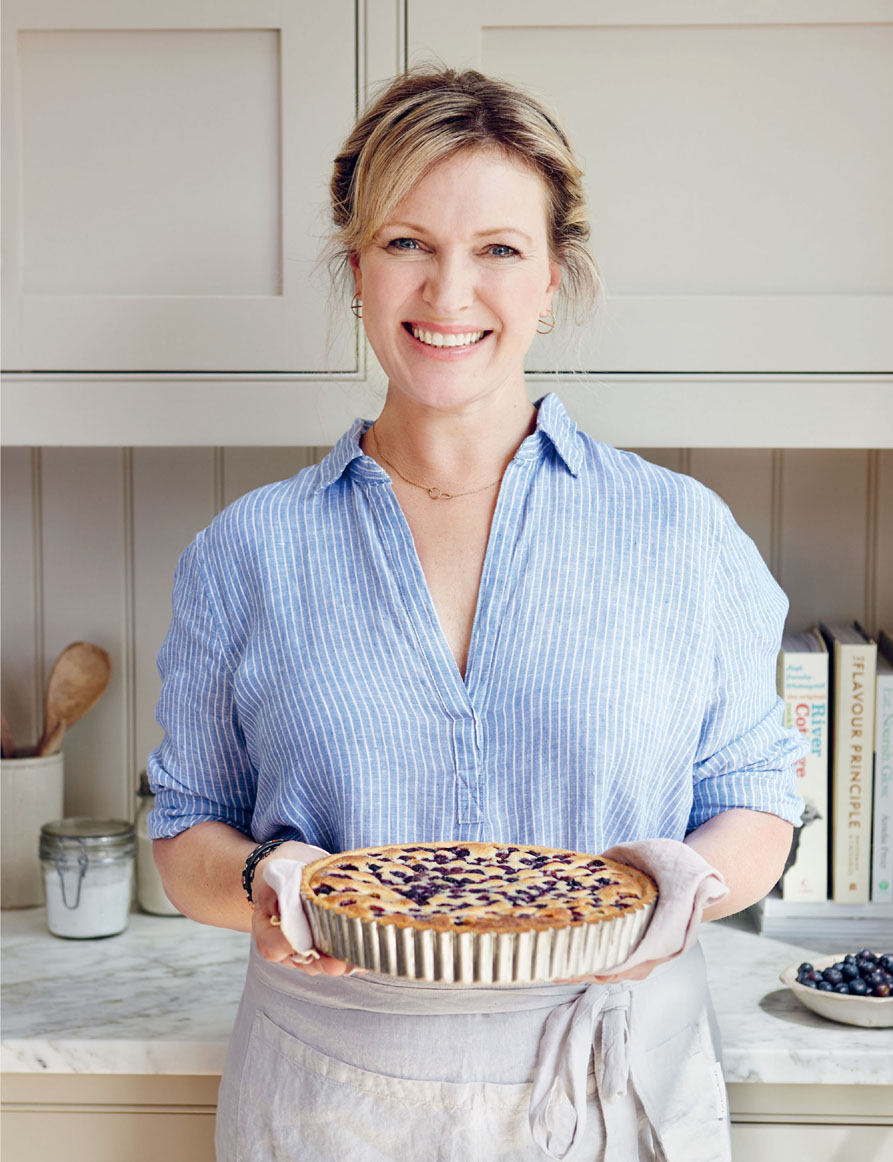
For me, biscuits are the easiest of bakes, and in this chapter I’ve provided a diverse range of recipes to suit all tastes. Everyone has their favourite, and for me it doesn’t get better than a simple Chocolate Digestive Biscuit, and they taste all the better when they’re freshly made. I’m also particularly fond of introducing different flavours to my batches – cinnamon and lemon, for example, or cranberry and orange, or even Parmesan and poppy seed (see here, here and here). It goes without saying that when it comes to cheese, there’s no better accompaniment than a nice savoury biscuit, so I’ve provided my Crunchy Oatcakes with Sesame Seeds, and my Cheddar and Herb Biscuits, but be warned, they’re incredibly moreish, especially with a chunk of Brie on top.
In the Sweet Bites chapter, you’ll find a collection of tasty treats to satisfy those pesky sugar cravings. For me, cupcakes always hit the spot, so I’ve included a few of my favourites, such as lemon meringue and Pear and Cardamom Buns. One of the best things about baking is the freedom it allows you to experiment and cater to your personal tastes. The Chocolate and Coconut Flapjacks, for example, encompass one of my all-time favourite flavour combinations – it will come as no surprise that I’ve always been partial to a Bounty bar! If your palate is piqued by something a bit more exotic, have a look at my Persian Almond Bites with Rosewater Syrup, which encapsulate some beautiful Middle Eastern flavours.
With all this talk of sweet treats it’s easy to forget all the wondrous Savoury Bakes on offer. In this chapter, you’ll find a recipe for every occasion. My Smoked Salmon, Tomato and Dill Tart, for example, is perfect for summertime picnics. In fact, I’m especially partial to a tart, and another favourite of mine is the Asparagus, tomato and spring onion version – its gorgeously light yet luxurious flavour is perfectly complemented by the crumbly shortcrust pastry. If you’re having friends and family over for the evening and the white wine is flowing, the Cayenne and Sesame Cheese Swirls and the Cheese and Rosemary Twists are the perfect canapés. Thankfully, they’re swift to make, so rustling up another batch when they’ve all been snaffled up isn’t any trouble! In Savoury Bakes, you’ll also find some hearty, warming meals for those brisk autumnal evenings, such as the Buttery Chicken and Mushroom Puff Pastry Parcels with Hollandaise Sauce, or my Smoked Haddock, Salmon and Prawn Pie. In truth, though, you really don’t need an occasion or excuse to enjoy these savoury recipes – I’ve been known to knock up a batch of Pea and Cream Cheese Madeleines on Sunday mornings for my family to enjoy throughout the day.
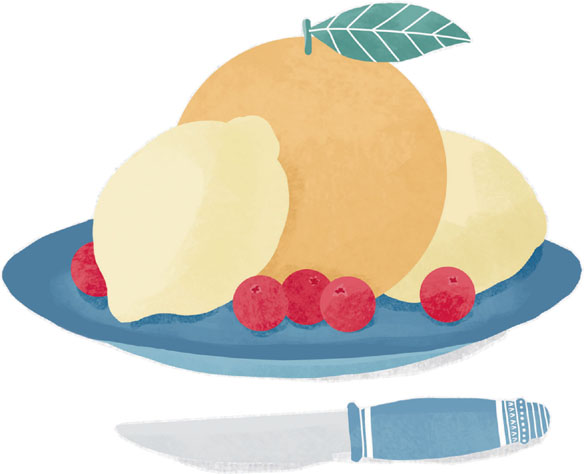
Leftover desserts, too, are often snacked on in my household. Desserts are a staple of any baker’s repertoire, and in this chapter I’ve included lots of my favourites. There’s a classic Tarte au Citron with a subtle twist, a traditional rice pudding made with sweet saffron and condensed milk and a Chocolate Pavlova with Salted Caramel Sauce, because who can resist such indulgence? You’ll also find some more unusual bakes that make the perfect pudding, such as the Tarte Tropézienne. Originating from St Tropez, this elegant cake is made from a sweet, enriched brioche and is filled with creamy vanilla crème pâtissière – a real treat, and so luxurious.
Last but not least, you’ll find plenty of mouth-watering dough-based recipes in the Breads chapter. I know many people with an aversion to baking loaves and scones and the like, but, honestly, they shouldn’t be avoided – not least because they give off the best aromas in the process. I’ve provided recipes for the things you’d typically pick up in the supermarket, such as Croissants, Pain aux Raisins and Naan Breads. Trust me, these are infinitely better and more satisfying when made from scratch. And you’ll also find some slightly more off-piste recipes, such as my Jewelled Kanellängd: a wonderful plaited bread infused with the perfume of cardamom. Be sure to try the Southern Cornbread, too – it’s delicious on its own (especially with extra Tabasco) and a great accompaniment to a warming chilli. It’s also a good illustration of how diverse bread can be; from Chocolate Brioche Swirl Loaf to scones and doughnuts, there’s something in this chapter for everyone.
Whether you’re a novice or a fully fledged baker, I hope that this book provides you with the resources and inspiration to explore all that the oven has to offer. These are truly some of my most loved recipes, and those of which my friends and family are particularly fond, too. So, whether it’s a quick half hour snatched on a busy weekday evening to whip up some biscuits, or a long, lazy afternoon dedicated to crafting a beautiful celebration cake, find a window to enjoy the time-honoured and much-loved craft of baking.
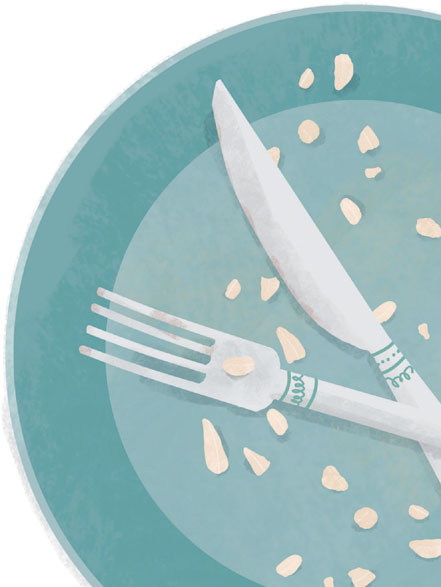
Ingredients
Store-cupboard basics include flour (plain, self-raising and strong bread flour), butter, caster sugar, eggs and raising agents such as baking powder, bicarbonate of soda (bread soda) and yeast. Different flavours and interest are created by using combinations of whole or chopped nuts, ground almonds, seeds, dried or fresh fruit, spices, syrups, chocolate or the delicate flavours of vanilla, honey, lavender, rosewater or fresh herbs. If you like to bake often, you can keep a store of basics as above, but you could also buy whatever you need for recipes as you go.
Luscious finishes for cakes
For cake fillings and toppings, several recipes in the book have variations on the buttercream theme, with icing sugar and butter as their base. But you will also find fresh cream, cream cheese and crème fraîche toppings and chocolate glazes. I recommend buying plain chocolate with 55–62 per cent cocoa solids for use in the recipes in this book, as it has a rich flavour that works perfectly in bakes.
Baking with yeast
A range of recipes using yeast appear in the book, and it’s worth understanding the types of yeasts available, as they are not all used in the same way. Fresh yeast can be bought from some bakers and, if properly wrapped up, lasts in the fridge for up to a month. Fresh yeast has to be activated by adding it to lukewarm milk or water and leaving it for 5 minutes or until it starts to become creamy. It is then added to the flour. You can also buy two kinds of dried yeast from supermarkets: active dried yeast is used in exactly the same way as fresh yeast, by first mixing it with liquid. Active dried yeast is twice as strong so you need to use half the amount compared to fresh yeast. Fresh fast-action, or easy-blend, dried yeast is mixed straight into the flour without pre-activating it. Most of the recipes in the book call for fresh yeast or active dried yeast.
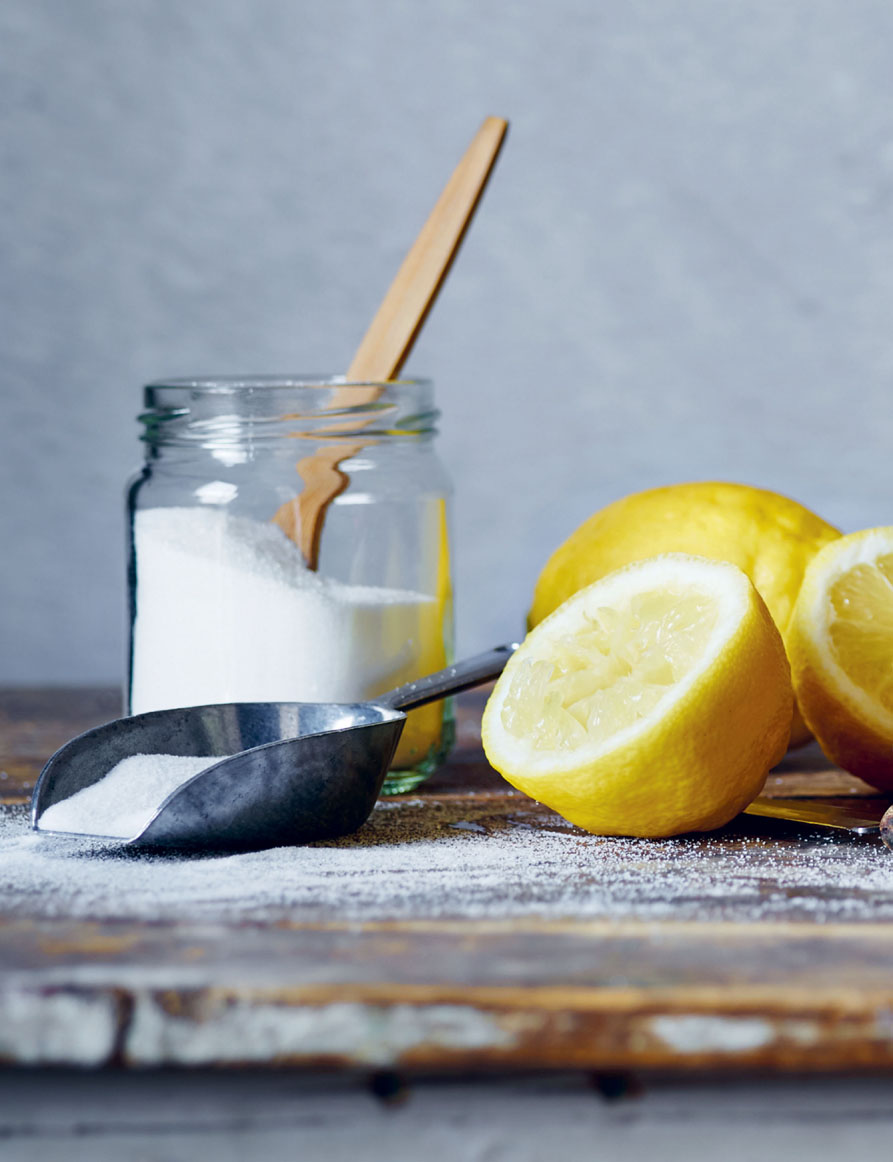
Equipment
Your baking basics can be simply a large mixing bowl, a wooden spoon, a rolling pin, a baking sheet (with a lip on one side) and the most commonly used cake tins: a 20cm (8in) square cake tin and a 20cm (8in) round cake tin – preferably springform with high sides. With those few pieces you can make a variety of cakes and biscuits from this book, including small square cakes such as brownies.
Many biscuits are cut directly from a biscuit dough rolled into a sausage shape, but for others you will need a 6cm (2½in) cutter, either round or shaped. It is also essential to use accurate kitchen scales.
Oven temperatures are given for a standard oven; if you are using a fan oven, reduce the stated temperature by 20°C.
From muffins to smooth icings
You will need muffin and cupcake trays to make those popular small cakes, and both usually require paper cases to fit them.
Other sizes and types of tin appear in the book, including, most frequently: a 25 × 38cm (10 × 15in) Swiss roll tin for making flapjacks, cake squares, traybakes and focaccia; a 900g (2lb) loaf tin for making bread loaves and sweet tea loaves; two 20cm (8in) sandwich tins for making sponge sandwich cakes; and a loose-bottomed 23cm (9in) tart tin for baking savoury or sweet tarts.
A baking tray (with a lip all round) is used for toasting nuts. For melting chocolate you will need a heatproof bowl that can sit just inside the top of a small saucepan. And a palette knife will enable you to create a smooth finish to a buttercream covering.
By hand or faster?
For speedy cake making, an electric beater will help you to cream sugar and butter together quickly – the basis of many cakes. A food processor will also do this for you. Most of the recipes in this book can be made without using a food processor or a stand mixer, although you can use them if you have them. A stand mixer, however, will make short and less tiring work of kneading yeast-based doughs.
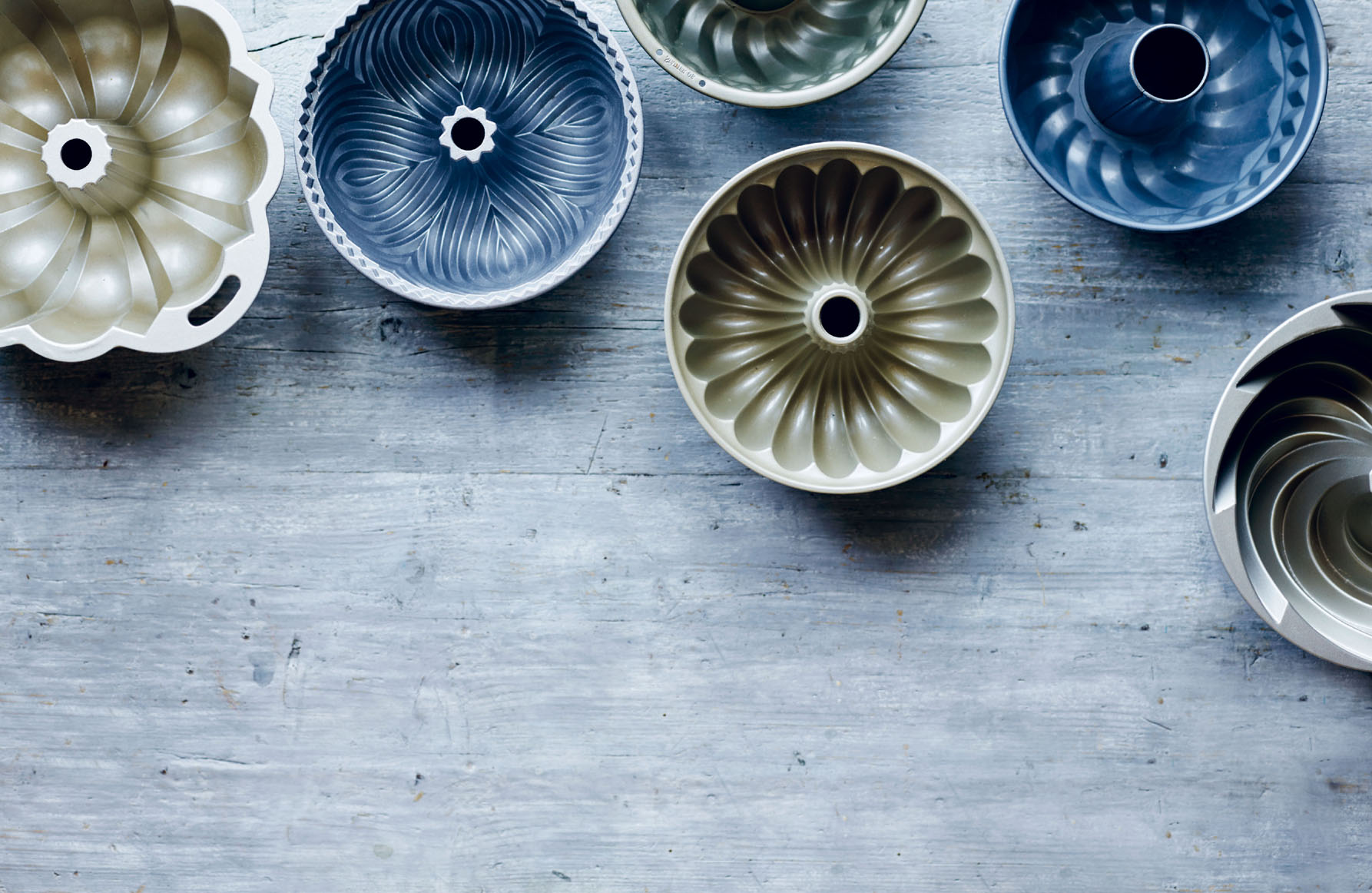
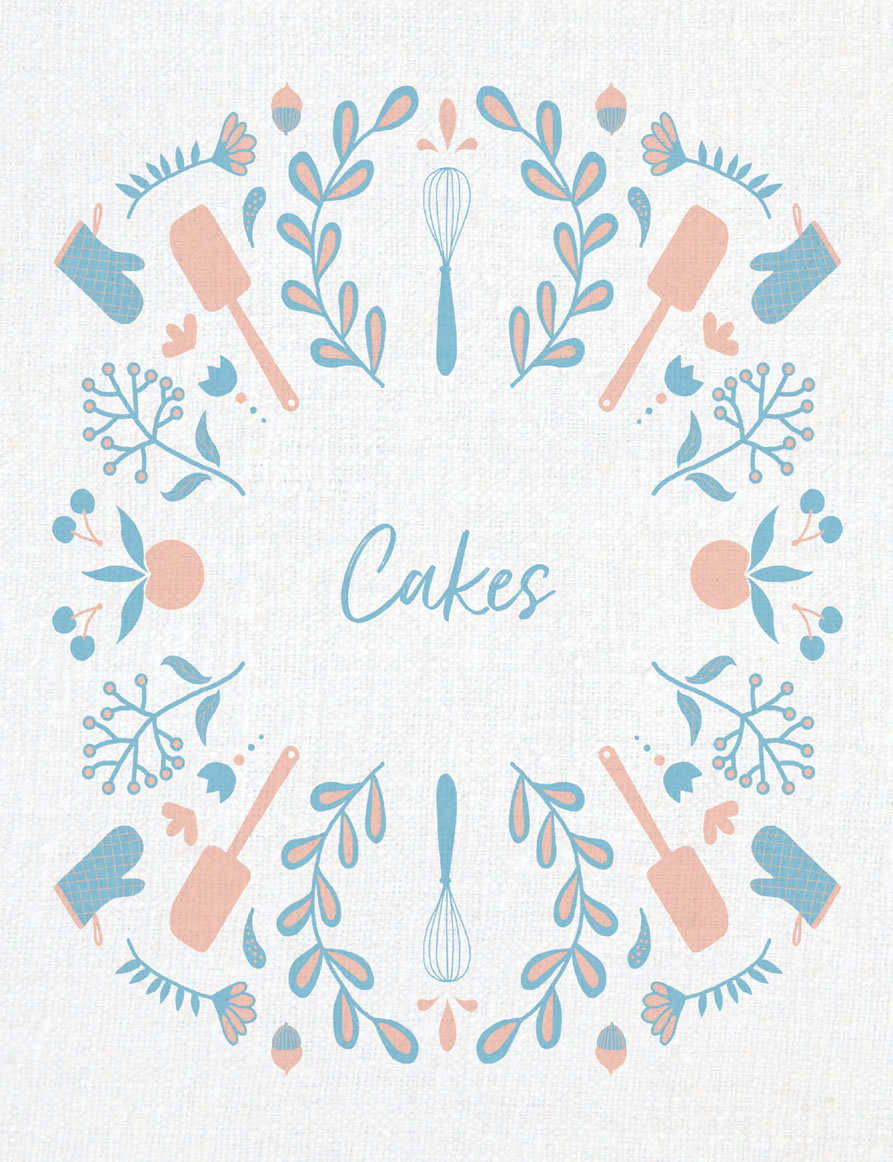
Brûlée meringue cake
Here is a creation from my friend and fellow Ballymaloe Cookery School teacher, Pamela Black, and it is such a fun cake to make. It starts so innocently, then ends with a mound of sugar and a flame! Do the brûléeing part in front of guests to delight them with some cooking theatrics.
Serves 8–10
225g (8oz) butter, plus extra for greasing
225g (8oz) caster sugar
1 tsp vanilla extract
4 eggs
225g (8oz) self-raising flour
225g (8oz) raspberry jam
For the buttercream icing
500g (1lb 2oz) icing sugar
225g (8oz) butter, softened
½ vanilla pod
2 tbsp milk
½ tsp vanilla extract
For the Meringue
6 egg whites
350g (12oz) caster sugar
three 18cm (7in) sandwich tins; piping bag and no. 7 plain piping nozzle; chef’s blowtorch
1. Preheat the oven to 180°C (350°F) Gas mark 4. Grease the sides of the tins, and line the bases with baking parchment. Put the butter in a large bowl and cream it with a wooden spoon until soft, or use an electric beater on slow or a food processor.
2. Add the sugar and vanilla extract, and beat until light and fluffy. Beat in the eggs one at a time, adding 1 tablespoon flour each time and beating well after each addition. Sift in the remaining flour and fold in to combine.
3. Divide the mixture between the tins and bake for 20–25 minutes until well risen, golden and springy to the touch. Leave the cakes to cool in the tins on a wire rack for 2–3 minutes, and then turn them out on the rack to cool completely.
4. While the cakes are cooling, make the buttercream icing. Sift the icing sugar into a large bowl and add the butter. Beat until smooth using an electric beater or a wooden spoon. Split the vanilla pod lengthways and scrape out the seeds into the bowl. Add the milk and vanilla extract, and beat until the mixture is light and fluffy.
5. Put one cake on a plate and spread it with half the jam and a thin layer of buttercream. Put another cake on top and spread with the remaining jam and another layer of buttercream. Top with the remaining cake. Spread the remaining buttercream over the top and sides of the cake, smoothing the sides as you go. Leave in a cool place for at least 1 hour before you make the meringue.
6. Put the egg whites in a clean, grease-free bowl and whisk with an electric beater until they form soft peaks, or use a food processor. Whisk in the sugar until it forms very stiff peaks – this can take 15–20 minutes.
7. Fill the piping bag with the meringue mixture and, starting at the bottom of the cake, pipe 2.5cm (1in) blobs or discs on to the icing. Turn the cake clockwise by 2.5cm (1in) after each piping and repeat the process until the cake is completely covered with meringue.





